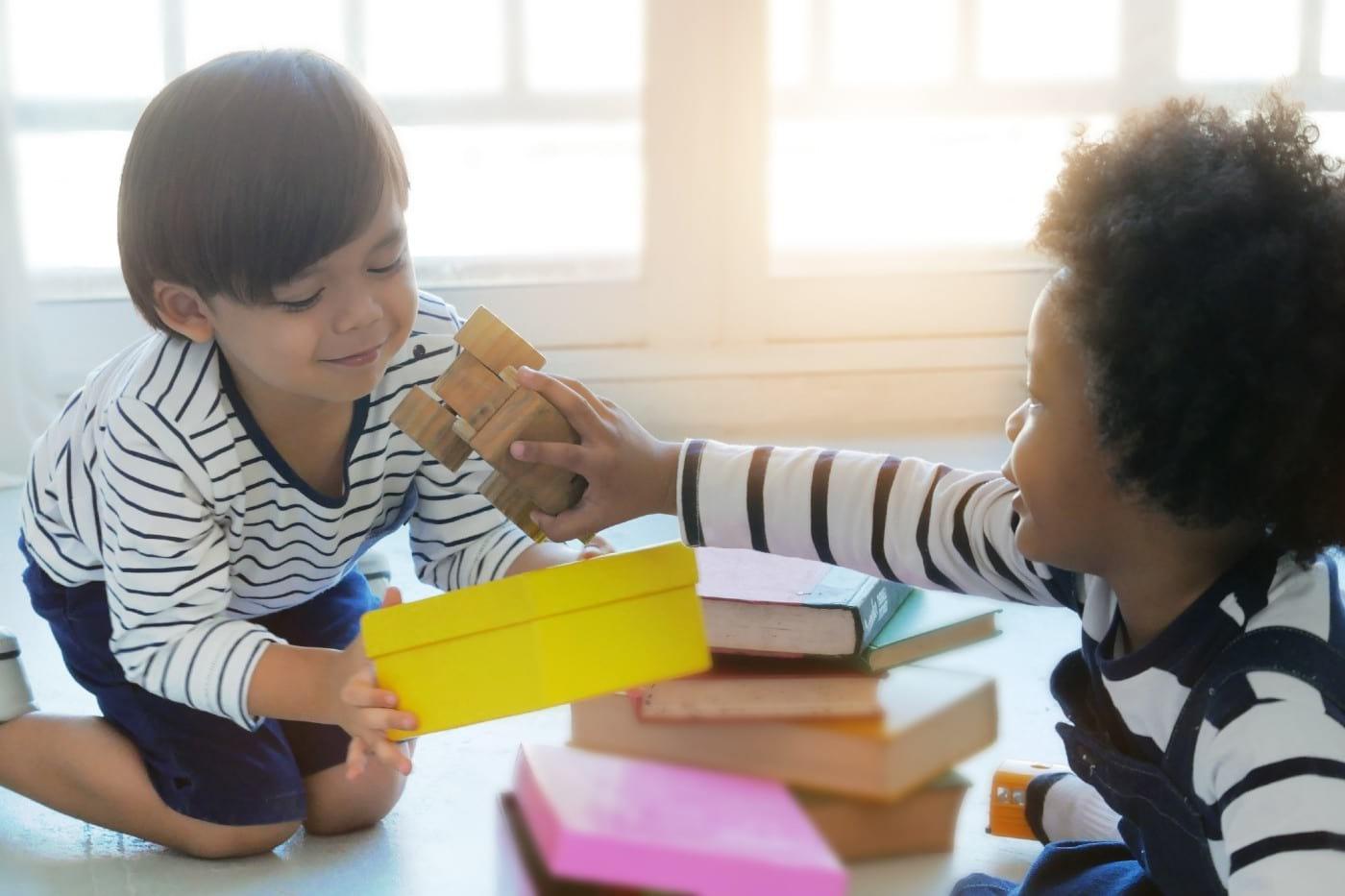TODDLER
What Kind of Nursery School Is Right for Your Child?
Montessori and Waldorf and Reggio Emilia…oh my!

Written by
Happiest Baby Staff

Gone are the days when nursery school was all sandbox play and storytime. And choosing a nursery school has gotten more complex, too! Now, there are lots of preschool options, often with each one boasting a different educational philosophy. So, which one do you choose?
As with most things in life, early education is not one-size-fits-all—there is lots to consider when it comes to nurturing your unique child's developing brain, intellect, and emotions. To help demystify the most predominant nursery school philosophies, we have created an easy-to-read list that unpacks six popular approaches to early education, so you can find the perfect fit for your family.
What is Montessori?
The Montessori Method was developed by an Italian physician Dr. Maria Montessori in the early 1900s. Through experimentation with her students, she realised that kids are eager learners. If given the right environment, kids could be encouraged and empowered to become self-directed toward active and independent learning. Unlike many conventional educational philosophies, however, the Montessori Method dismisses standardised tests and grades. Instead, there is a high value placed on 'children's work' through play and curiosity. In 2017, a team of researchers reviewed the Montessori's teaching methods and found that it is broadly effective.
A typical Montessori nursery school experience:
- Kids will have long blocks of uninterrupted 'work' time that is self-directed.
- Activities are set up at stations where kids rotate through during their work times.
- Kids are usually in mixed-age groups to eliminate competition and to promote independent learning.
- Toys, crafts, and other materials are regularly switched-up to promote curiosity and exploration.
- Social justice, conflict resolution, and leadership are seen as lifelong skills that children as young as pre-k age are encouraged to develop.
What is Reggio Emilia?
Reggio Emilia—also born in Italy—was developed by Loris Malaguzzi in 1945, at the end of WWII. This approach places a high value on teaching children to honour their inner languages and self-esteem by focusing on their intellectual and emotional development. Kids are taught from a very young age to respect their personalities, needs and to feel empowered to express their ideas and feelings in various positive ways. It is important to know that Reggio Emilia is not a method but rather a philosophical ideal and approach to teaching. The key is that kids are respected and honoured for their potential, capabilities, and humanity.
In a typical Reggio Emilia nursery school experience:
- Lots of hands-on exploration of crafts and creative arts.
- Storytelling, make-believe, and other forms of imaginative play.
- Kids are encouraged to express feelings and explore their identities.
- Students have an atelierista, or art teacher, who helps them learn how to express their emotions through creative play and direction.
What is Waldorf?
Waldorf was founded by Rudolph Steiner in the early 1900s. The Waldorf method centers on integrating a wide range of arts into all areas of academic study. Parents can expect instruction on the world's religions, myths, dance and movement, music, art, and philosophy. Waldorf aims to raise students who can be flexible learners who will go out into the world and continue to explore their intellectual and creative curiosity.
In a typical Waldorf nursery school experience:
- Kids have circle time to practice singing, poetry, drawing, and dance or movement.
- Teachers share folk stories from around the world.
- Kids partake in activities such as gardening, cooking, woodworking, and sewing.
- Kids practice social skills with one another.
What is the High-Scope nursery school approach?
Similar to Montessori and Waldorf styles, High Scope looks at play as a key component to successful learning. However, what sets High Scope apart is that teachers are encouraged and trained to use academic assessments as a tool for helping kids learn and advance through the curriculum. The classroom is seen as a community where teachers are viewed as students' partners. Together, they use play as a central element in lessons with the goal of learning social skills, academic skills, and problem-solving skills.
In a typical High Scope nursery school experience:
- Kids are broken up into small groups to learn together.
- Activities are all hands-on learning experiences.
- Kids can expect to get messy with art, building, and creative materials, from seashells and sand to paint and clay.
- Teachers will use creative play to present problems that the kids will work together to solve.
What is the Bank Street nursery school approach?
Lucy Sprague Mitchell developed the Bank Street teaching style in the early 20th century. She wanted to find a way to educate children with a holistic approach that engaged kids' physical, emotional, intellectual, and social realms. To do this, each lesson that children encounter with their teachers and learning spaces is developed to challenge their developmental age within these categories of the student's self. Classrooms are typically mixed in age ranges to eliminate competition, and students are given an opportunity to choose how to participate in activities—they can observe or get hands-on.
In a typical Bank Street nursery school experience:
- Every activity is play-based, and kids are encouraged to use their imagination skills.
- Teachers use play to introduce different concepts; for example, if a child is pretending to play with a toy flower, then a teacher will explore with the child where flowers come from, how they are grown and details about what makes a healthy environment for plants. This simple task of play becomes a science lesson.
- Kids are encouraged to learn with other kids of different ages and development stages.
What are parent co-op nursery schools?
In a parent co-op preschool, like-minded parents pool their resources to hire a teacher to educate their children, while essentially acting as the school’s admins. Parenting co-ops had existed for many years but became popular during the 2020 COVID crisis, when most schools across the country were closed or reduced to online learning.
In a parent co-op early learning group, the parents and the teacher or tutor agree upon a curriculum and a schedule of study. Since parenting co-ops are so open-ended and have myriad learning opportunities, there is no one set methodology or approach to teaching style. Many parents choose this option because it allows them to have more control over their children's safety and education, it gives them the chance to observe their kids, and it opens up a community of other parents with whom they can bond.
That said, families who choose to start a learning pod or co-op must defer to their state-standards for education to make sure that their children are meeting their academic milestones.
Disclaimer: The information on our site is NOT medical advice for any specific person or condition. It is only meant as general information. If you have any medical questions and concerns about your child or yourself, please contact your health provider. Breastmilk is the best source of nutrition for babies. It is important that, in preparation for and during breastfeeding, mothers eat a healthy, balanced diet. Combined breast- and bottle-feeding in the first weeks of life may reduce the supply of a mother's breastmilk and reversing the decision not to breastfeed is difficult. If you do decide to use infant formula, you should follow instructions carefully.
SHARE THIS ARTICLE
PARENT PICKS
Bestsellers



















